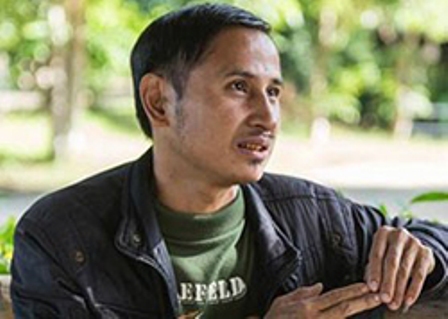The indictment of Chaiwat Limlikit-aksorn, former chief of Kaeng Krachan National Park, and three other park officials for the premeditated murder of Karen activist Pholachi “Billy” Rakchongcharoen that was announced on 15 August 2022, is a welcome step towards justice, said the International Commission of Jurists (ICJ) today.
The ICJ calls on the prosecution to proceed with full respect for the right to a fair trial consistent with international law, and without recourse to the use of the death penalty.
Billy has been the victim of an apparent enforced disappearance for more than eight years, as he was last seen on 17 April 2014 in the custody of Kaeng Krachan National Park officials.
The indictment for premeditated murder and other charges, approved on 10 August by Thailand’s Attorney General, will be submitted to the court.
“After eight years of delays these indictments are welcome progress but Thailand must ensure that everyone allegedly involved in the killing of Billy now face justice through fair trials, regardless of their position,” said Kingsley Abbott, the ICJ’s Director of Global Accountability and International Justice. “This will ensure that the necessary accountability is achieved through proper process in accordance with the rule of law.”
While welcoming progress in the long delayed investigative process, the ICJ regrets that the prosecutorial authorities will not be in a position to include specific charges of the crime of enforced disappearance in their indictment.
“The case has all the hallmarks of being an enforced disappearance so the fact the indictment did not charge this offence reveals significant gaps in domestic Thai law that need to be filled,” said Abbott.
Thailand has signed but not yet ratified the International Convention for the Protection of All Persons from Enforced Disappearance (ICPPED) and is a State Party to the International Covenant on Civil and Political Rights (ICCPR) and the Convention against Torture and other Cruel, Inhuman or Degrading Treatment or Punishment (CAT).
However, Thailand’s domestic legislation does not yet criminalize enforced disappearance or torture and ill-treatment.
Efforts to pass the Draft Prevention and Suppression of Torture and Enforced Disappearance Act have been delayed for more than 15 years. After several extensions of the deadline to complete the review, the Draft Act was eventually approved by the House of Senate on 9 August 2022. It is expected to be submitted to the House of Representatives, which will decide whether to accept the Senate’s amendments.
“This case emphasizes how important it is that Thailand accede the Convention Against Enforced Disappearance and pass the Draft Prevention and Suppression of Torture and Enforced Disappearance Act consistent with international law and standards, without delay,” added Abbott.
Background
Billy was last seen on 17 April 2014 in the custody of Kaeng Krachan National Park officials. The officials claimed they detained Billy for illegal possession of honey but released him later the same day.
On 12 September 2019, after the Thai Ministry of Justice’s Department of Special Investigation (DSI) had located bone fragments that they identified as likely belonging to Billy, the Ministry of Justice provided financial payments to Billy’s family in accordance with the Act on Victim Compensation and Expense Reimbursement in Criminal Cases (2001). They were granted 140,000 THB (approx. 3955 USD), which did not constitute effective redress under international law and standards.
On 23 December 2019, eight charges, including premeditated murder and concealing the body, were brought against four officials of Kaeng Krachan National Park, with whom Billy was last seen.
In January 2020, public prosecutors suddenly dropped seven murder-related charges against the four accused on the basis that there was insufficient evidence to take the cases to trial.
Due to these conflicting decisions, the case was submitted to the Director-General of the DSI and then the Attorney General to make a final determination, pursuant to Thai law.
The charges approved by the Attorney General include:
- Premeditated murder (section 289(4), Criminal Code);
- Murder for the purpose of securing the benefit obtained through the other offence, or concealing the other offence or escaping punishment for the other offence committed by him (section 289(7), Criminal Code);
- Compelling the other person to do or not to do any act, or to suffer any thing by putting him/her in fear of injury to life, body, liberty, reputation or property of him/her or another person, or committing violence so that he/she does or does not do such act, or suffers such thing (section 309, Criminal Code);
- Detaining or confining the other person, or by any other means whatever, depriving a such person of the liberty of person, and causing death to the person detained (section 310, Criminal Code); and
- Performing any act to the corpse or a surrounding area where the corpse is discovered before the autopsy is completed, in a manner likely to cause the autopsy or the consequence of the case to be changed (section 150 bis, Criminal Procedure Code)
If convicted, the accused could be sentenced to the death penalty. Section 289 of the Criminal Code makes the death penalty mandatory for premeditated murder, save for extenuating circumstances including lack of intelligence, serious distress, previous good conduct, the repentance and efforts made by the offender to minimize the injurious consequence of the offence, voluntary surrender to an official, the information given to the Court for the benefit of the trial, or the other circumstance which the Court considers to be of similar nature (section 78, Penal Code). Such mandatory prescription of the death penalty fails to comply with Thailand’s obligations under articles 6 and 14 of the ICCPR.
The ICJ opposes capital punishment in all cases without exception as a violation of the right to life and to freedom from cruel, inhuman or degrading punishment.
Download the statement with detailed background information in Thai.




